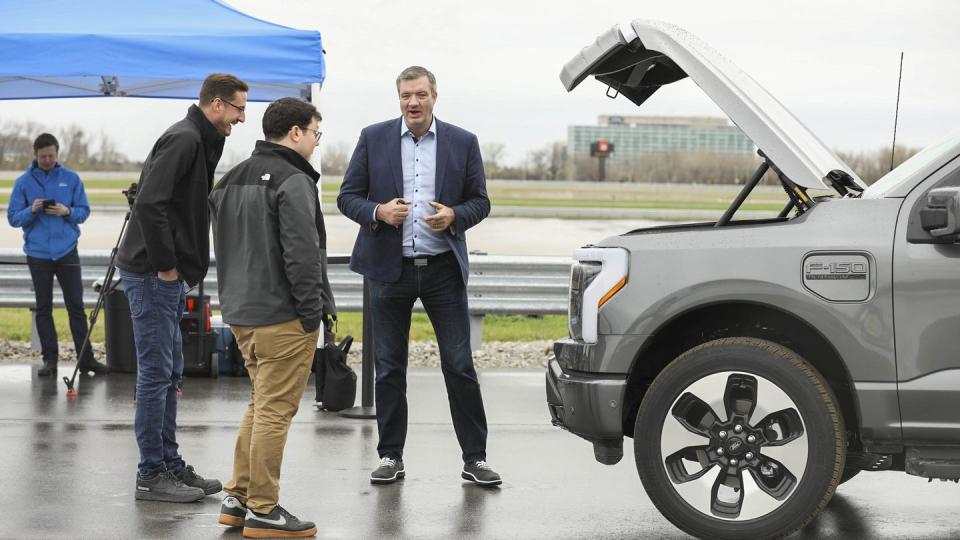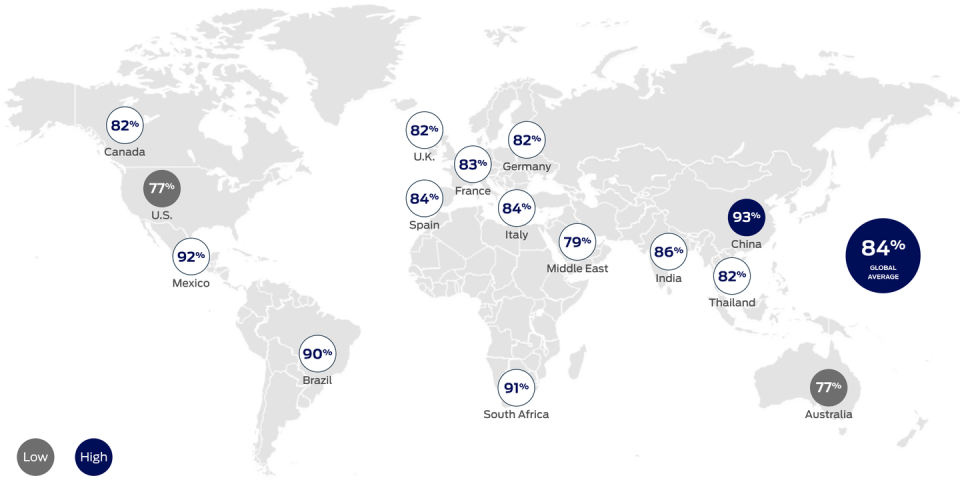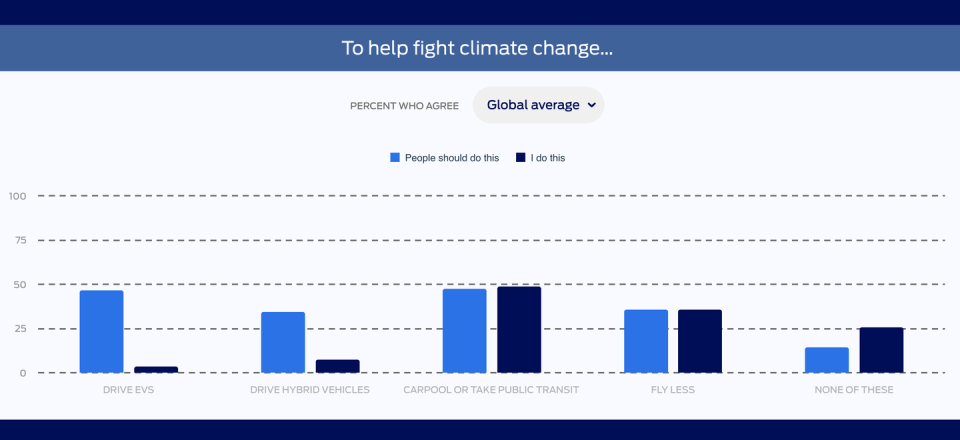Consensus Is Building Globally to Fight Climate Change, Ford Survey Finds

"Hearst Magazines and Yahoo may earn commission or revenue on some items through these links."
Ford’s chief futurist says the worldwide survey of 16,000 people reveals 69% say all-electric vehicles are the future (compared to 59% in the US, alone).
Globally, 47% of the respondents agree that people should drive EVs, but just 4% drive EVs themselves, and 35% say people should drive hybrids and 8% actually do so. (Ford F-150 Lightning is pictured above at a consumer test driving clinic in Dearborn, Michigan.)
Some 73% of those surveyed worldwide “worry about not having enough infrastructure to support EVs.”
It is important to “actively fight climate change today,” said 84% of people polled globally for the Further With Ford 2024 trends report, which this year carries the theme, ‘Charting My Path.’
The number is 77% in the United States and Australia on the low end, with 93% in China on the high end, Ford’s chief futurist, Jennifer Brace, said in a Society of Automotive Analysts webinar Thursday.
More from the annual survey of 16,000 respondents—“not focused on Ford customers,” according to Brace—from the general population of 16 countries: 69% say all-electric vehicles are the future.
US is third-lowest on this question, at 59%, above only France (47%) and Germany (50%). For the oil-rich Middle East, 78% expect EVs to take over some day.
What does this mean for the recent downshift in Ford’s transition to EVs, placing more emphasis on plug-in hybrids for the interim?
These results are designed to give the automaker a bird’s eye view of what is happening around the world, a scan of consumer sentiment and identity shifts, Brace explained.

Like most corporate futurist studies at a variety of corporations since early in the industrial revolution, the annual Further with Ford survey is designed to map out where the world is heading, not to give the company specific direction on how to plan for the changes. But ‘Charting My Path’ does back up Ford’s recent EV-to-PHEV downshift.
Globally, 47% of the respondents agree that people should drive EVs, but just 4% drive EVs themselves, and 35% say people should drive hybrids and 8% actually do so.

“The hope is that these are people who are willing to do that,” Brace said of that 47% and 35%, and she expects many of them will buy one or the other when they get to their next car.
Globally, 73% of those surveyed “worry about not having enough infrastructure to support EVs,” which is higher than the number for the same question from the 2020 survey, 72%. Asked to agree with the statement, “I’m waiting to buy an EV until more people I know have them,” 56% globally said “yes,” breaking down to 54% for females and 58% for males.
Much of ‘Charting My Path’ has little direct connection with attitudes about buying new cars and trucks, although there are plenty of data for product planning. The question, “In the next 10 years, my ideal living/family situation looks like …” 26% “having children” vs. 34% “having pets” might dictate the need to design more two-row SUVs and fewer three-row SUVs.
“I am afraid of AI”: 51% agree, an 11% increase from the 2019 survey. “I don’t really understand AI”: 50% agree, up 6% from 2019. And 55% agree “AI will be stronger than the human mind within 10 years,” a 7% increase over five years. Perhaps this is why Ford has removed parallel parking capability from its automated vehicle technology?

Globally, 29% like the idea of “digital detoxing,” cutting back on smartphone use, or shutting it off for a day, for example, with the number 28% in the US and a high of 46% in India. Brace anecdotally noted newfound popularity of old-fashioned, non-smart flip phones among Generation Z. Self-care trends emphasizing serenity bode well for Lincolns, with their quiet, coddling interiors, she said.
But then there’s “Working for Balance,” in which 77% globally of those employed agree with, “I prioritize a balanced personal worklife over my advancement at work,” and that 52% globally of those employed agree “to achieve a lifestyle that prioritizes my quality of life, I would be willing to take a 20% pay cut.”
Try making the monthly payments on a Lincoln with that.
If you believe that climate change is real, have you altered your lifestyle? If so, how? Please comment below.

 Yahoo Autos
Yahoo Autos 